Lacrosse in Australia is a minor sport, with a long and proud history dating back to 1876, with a small but dedicated community of participants and volunteers. The established centres for lacrosse are in the greater metropolitan areas of Melbourne, Adelaide, and Perth. In these cities there are organised weekend field lacrosse competitions for men and women at senior and junior levels, played over the winter months. In the off-season, there are informal box lacrosse and sofcrosse competitions, though the majority of players in Australia are mostly of the field lacrosse type. Some lacrosse is also played in Sydney, South East Queensland, Canberra, Ballarat and Bendigo, it is very much at the developmental level.
Universal football was the name given to a proposed hybrid sport of Australian rules football and rugby league, proposed at different times between 1908 and 1933 as a potential national football code to be played throughout Australia and New Zealand. The game was trialled, but it was never otherwise played in any regular competition.

Australian rules football in New South Wales is a team sport played and observed in the Australian state. It dates back to the colonial era in 1866, with organised competitions being continuous since the 1880s. Today, it is popular in several regions of the state, including areas near the Victorian and South Australian borders—Riverina, Broken Hill, and South Coast. These areas form part of an Australian cultural divide described as the Barassi Line. To the east of the line, it is known as "AFL", named after the elite Australian Football League competition. AFL NSW/ACT is the main development body, and includes the Australian Capital Territory.

Wentworth Park is a park near the suburbs of Glebe and Ultimo in Sydney, New South Wales, Australia.

Phillip Henry Matson was a record-breaking swimmer, and both a highly successful player and coach of Australian rules football in the early 20th century, chiefly in Western Australia.
William George "Twit" Tasker was an Australian World War I soldier who had been a national representative rugby union player making six Test appearances for the Wallabies.
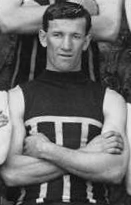
William John Ashley was an Australian rules footballer who played with Port Adelaide in the SAFL from 1912 to 1915 and 1919.

James Jackson was an Australian rules footballer who played with the St Kilda Football Club and the Collingwood Football Club in the Victorian Football League (VFL), and with the Hawthorn Football Club in both the Victorian Football Association (VFA) and the VFL.
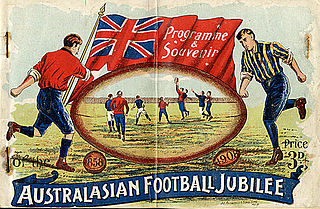
The 1908 Melbourne Carnival was the inaugural Australian National Football Carnival, an Australian football interstate competition, held in Melbourne in August 1908. It was known at the time as the Jubilee Australasian Football Carnival because it was designed to commemorate 50 years of Australian football.
The 1911 Adelaide Carnival was the second edition of the Australasian Football Carnival, an Australian football interstate competition. It took place from 2 to 12 August at Adelaide Oval.

Ralph Robertson was an Australian rules footballer who played with St Kilda in the Victorian Football League (VFL) and had a noted career in New South Wales.
The 1927 Melbourne Carnival was the sixth Australian National Football Carnival: an Australian football interstate competition.

The 1933 Sydney Carnival was the eighth edition of the Australian National Football Carnival, an Australian football interstate competition. The carnival was held in Sydney over an eleven-day period between Wednesday 2 August and Saturday 12 August.
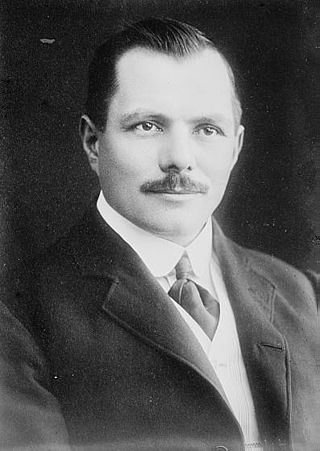
Hugh Donald "Huge Deal" McIntosh was an Australian theatrical entrepreneur, sporting promoter and newspaper proprietor

Arthur "Jack" Verge was a rugby union player who represented Australia, New South Wales and Sydney University. Playing as a fullback, Verge won both his caps for Australia in 1904 against a touring team from the British Isles. Although he was relatively light for his position, he was repeatedly praised for his tackling and all-round defensive work, and in attack, he was a fast and deceptive runner. His kicking, on the other hand, was inconsistent.
Leslie Barkly Charge was an Australian rules footballer who played with South Melbourne in the Victorian Football League (VFL).
John Hayes was an Australian rules footballer who played with Footscray in the Victorian Football League (VFL).
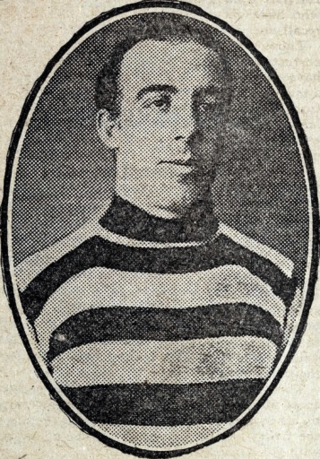
Alexander Gordon Desmond Baird was an Australian rules footballer who played with South Melbourne and St Kilda in the Victorian Football League (VFL). He played a prominent part in the 1913 VFL Grand Final; his decision to handball in the final minutes, instead of shoot at goal, is often blamed as having cost St Kilda the premiership.
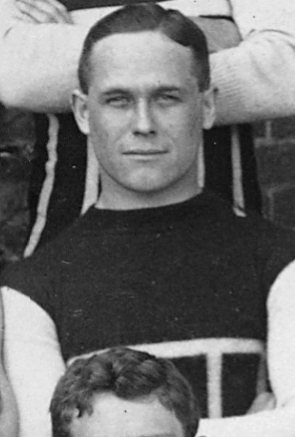
John William Robertson was an Australian rules football player for Port Adelaide. His career was cut short due to World War I and the injuries obtained in the conflict.

Percy William Vaughan, known as Colonel Vaughan, was a bank manager and officer in the Australian Army.

















